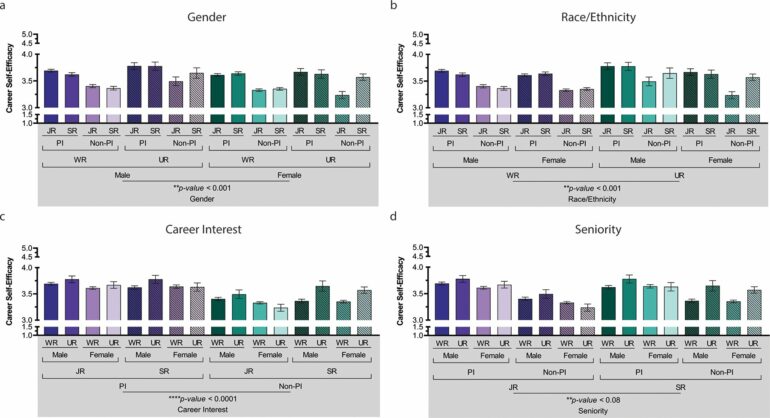For Ph.D.-trained scientists, career self-efficacy—or one’s assurance in carrying out their career plans—is incredibly important for their livelihood and mental health.
Rebekah L. Layton, Ph.D., director of professional development programs in the Office of Graduate Education (OGE) at the UNC School of Medicine, co-led a multi-institutional team that sought to understand the role that racial, ethnic, and gender disparities play in the career self-efficacy of doctoral and postdoctoral trainees.
After polling 6,000 graduate and postdoctoral respondents across 17 U.S. institutions, researchers found that self-efficacy was generally lower than anticipated, particularly among those with higher levels of expertise and experience. Their results were recently published in the journal PLOS ONE.
“We hope our findings will spur program evaluation and policy changes, and prompt future studies to identify which factors can be tested and implemented to build career self-efficacy most effectively,” said Layton, who is also an associate professor in the UNC School of Education. “We hope to do so while leveraging gender and social identities, career interests, and training experience/seniority.”
The researchers used an intersectional approach for their study. This particular approach allows researchers to look at how a combination of factors—such as racial, ethnic, and gender identities—have an impact on individuals, as opposed to only considering each factor independently.
Intersectional approaches fill a significant gap in graduate and postdoctoral education and training, according to study co-lead Deepshikha Chatterjee, Ph.D., assistant professor of psychology at Baruch College, Weissman School of Arts and Sciences, Baruch College and the Graduate Center, City University of New York.
“Intersectional approaches to professional development and examination of career self-efficacy in graduate and postdoctoral education and training have often been lacking,” Chatterjee said.
Moving forward: How to improve self-efficacy
Most notably, their findings highlight a need to find new and efficient strategies for increasing trainee career self-efficacy. These include earlier career exploration and training options, expanding mentoring opportunities, and creating positive feedback loops in science training.
This study also reinforces the researchers’ commitment to offering thoughtful and focused opportunities for Ph.D. professional development. For example, lower levels of career self-efficacy were reported by those with non-PI career interests, which suggests that providing career training opportunities outside the conventional academic research track may be beneficial for trainees with a wide range of career interests.
“We often hear the importance of trainees in the pipeline, but to use this understanding towards positive change can be tricky,” said co-author Ana T. Nogueira, Ph.D., a postdoctoral research fellow in the UNC Department of Pharmacology and former education research fellow in UNC School of Medicine Office of Graduate Education. “So, collecting and analyzing data allows us to build a platform as well as create awareness toward trainees’ obstacles in selecting and pursuing their career of choice. Let’s use data to inform us and guide us.”
Ultimately, the researchers hope that this work contributes to the evidence-based literature on graduate and postdoctoral education and training, and spurs conversations about the importance of customizing the postsecondary educational experience.
“We hope that this work will contribute to more intentional consideration of these and other such factors in career development programming and educational program design,” said study co-lead Sunita Chaudhary, Ph.D., associate professor at Rutgers Robert Wood Johnson Medical School and director of research education at Rutgers Cancer Institute of New Jersey.
Meeting trainee needs at UNC
One program at UNC-Chapel Hill is already putting these new findings into practice.
The Training Initiatives in Biological and Biomedical Sciences (TIBBS) Program, housed in the University of North Carolina School of Medicine’s Office of Graduate Education, provides trainee-led career development opportunities by career interest as well as by identity groups.
“We look forward to continuing to evolve our programming to meet the needs of all trainees, informed by evidence-based research such as this study,” said co-author Christiann Gaines, Ph.D., the new assistant director of diversity doctoral diversity and success in the Office of Graduate Education at UNC.
TIBBS houses a number of career cohorts, which are open to all life science graduate and postdoctoral scholars, including: Academic and Research Intensive Career Association (ARIC), Future Science Educators (FuSE), Science Writing and Communications Club (SWAC), Science Policy and Advocacy Group (SPAG), Medical and Regulatory Affairs Club, and the Graduate Business and Consulting Club (GBCC).
And because TIBBS supports the whole person and adopts a holistic approach, the program understands the value of social support networks and shared identities in delivering professional development opportunities that are specifically catered to trainees’ needs.
The following trainee-led affinity groups are organized by different racial, gender, and social identities: the Society for Black Biomedical Scientist (SBBS), the Society for Advancement of Chicanos/Hispanics and Native Americans in Science (SACNAS), Women in Science (WinS), STEM Pride, and Global Perspective in Biosciences (GPB).
In addition to Ph.D.-level professional development club activities, TIBBS frequently partners with the UNC SOM Initiative for Maximizing Student Development (IMSD) to offer career development opportunities in smaller groups and communities with shared experiences. The collaboration offers opportunities for small group interactions and the ability to tailor materials to student topics of interest and their experiences.
“I am certain this work will be essential to understanding how we, as a community, can better service our students, no matter what background, to pushing them toward great and productive science careers,” said Nisan M. Hubbard, Ph.D., who was a former UNC SPIRE Fellow and co-author on the paper. “The more we ask and investigate how we can better mentor our students in successful careers, the more we can raise their confidence and determination in attaining their career dreams.”
More information:
Deepshikha Chatterjee et al, Career self-efficacy disparities in underrepresented biomedical scientist trainees, PLOS ONE (2023). DOI: 10.1371/journal.pone.0280608
Provided by
University of North Carolina School of Medicine
Citation:
Researchers examine career confidence in underrepresented biomedical scientist trainees (2023, March 2)



